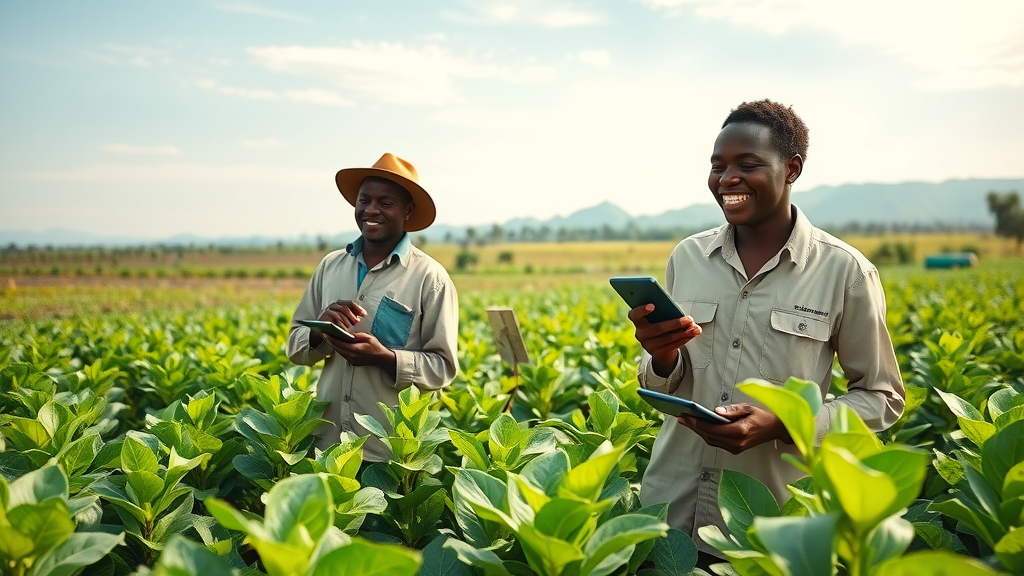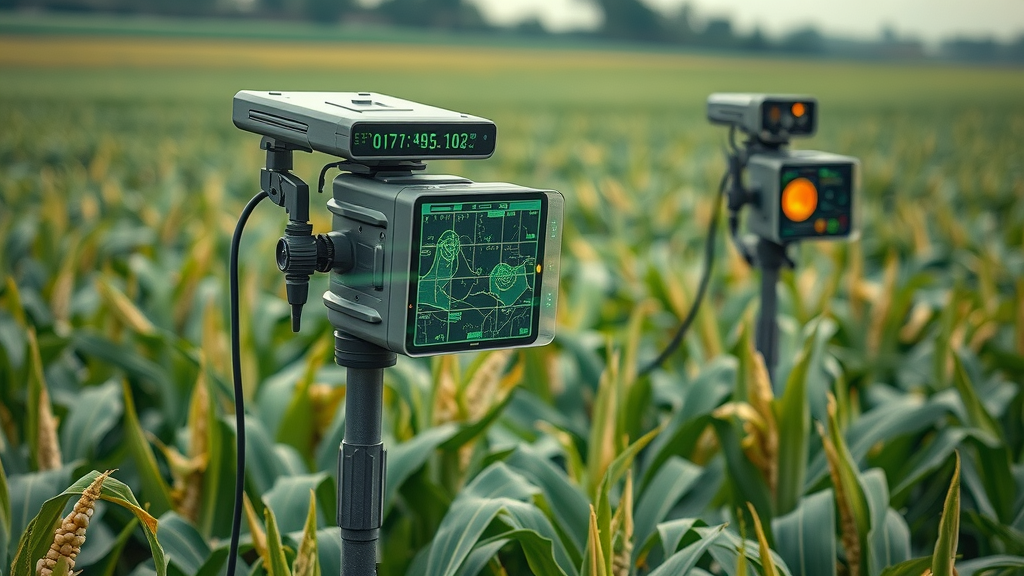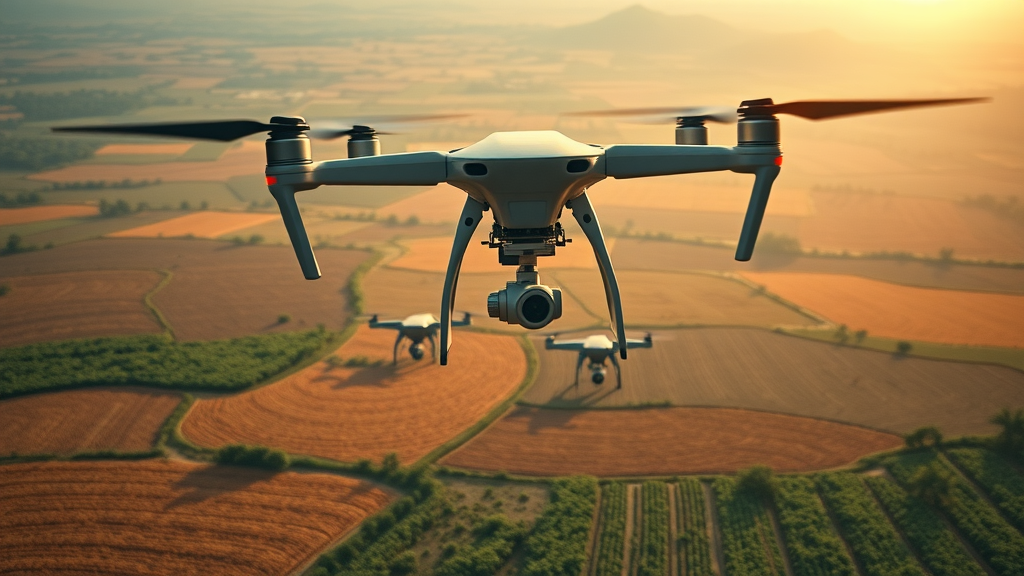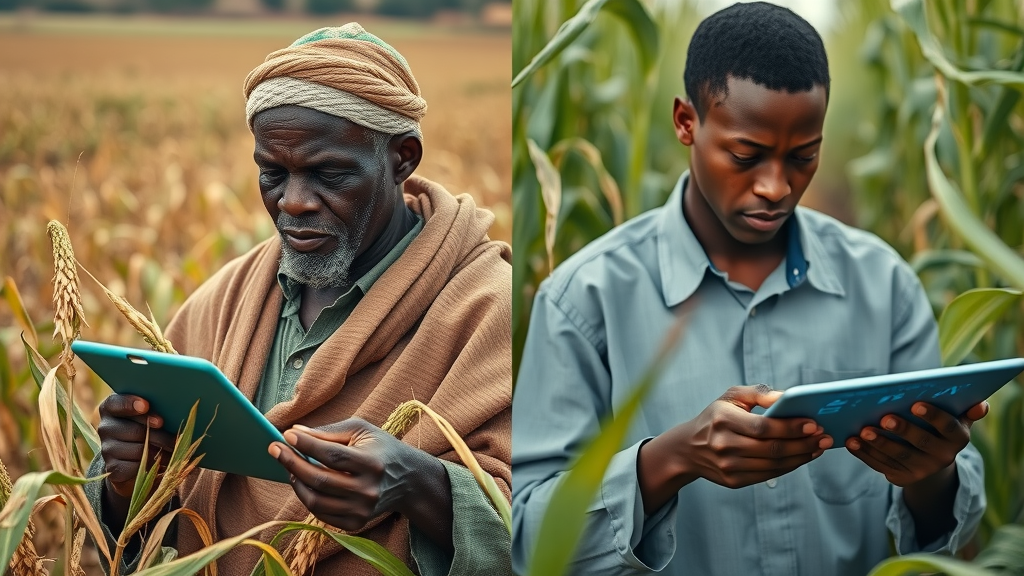In 2026, African smallholder farmers are on the brink of a productivity revolution, powered by artificial intelligence. Imagine a future where a single mobile app can help predict the next pest outbreak, recommend optimal irrigation schedules, and access premium markets in real time—right from the palm of every farmer’s hand. This is no longer a distant dream: AI for African smallholder farmers is set to boost average crop yields by over 40%, making history and transforming communities forever. Read on to explore how this AI-driven transformation is making food security, profitability, and sustainability possible for millions across the continent.

Why AI for African Smallholder Farmers in 2026 is an Unstoppable Force
The promise of AI for African smallholder farmers has moved from buzzword to reality faster than anyone anticipated. Modern challenges—climate variability, pest invasions, unpredictable markets—once kept yields low and farming highly risky for smallholder farmer communities. Now, with access to low-cost smartphones and rapidly expanding mobile internet, African farmers are plugging into a new world of precision farming. AI applications analyse satellite data, scan crop leaves for disease, and connect farmers to new buyers directly. The result? A digital revolution empowering smallholder farmers to make informed decisions in real-time.
In the heart of rural Africa, ICT-driven solutions are helping close the "yield gap" between African and global averages, especially for staple crops like maize and cassava. Notably, AI doesn't merely digitise old methods; it supercharges them. Insights that took days or weeks for local extension officers to deliver now reach farmers instantly, shrinking the time between diagnosis and action. From northern Ghana’s rice paddies using predictive analytics to Kenya’s tomato growers leveraging AI for pest alerts, practical examples of this unstoppable force are multiplying—and changing the narrative from dependence to self-sufficiency.
"By 2026, the average African smallholder farmer equipped with AI is expected to increase crop yields by over 40%."
Harnessing Artificial Intelligence for African Smallholder Farmers: Transformative Potential at the Farm Level
Defining Artificial Intelligence in Smallholder Farms
Artificial intelligence on the African smallholder farm is not some far-flung futuristic idea—it’s a practical toolbox. AI-driven imaging now detects early-stage crop diseases, protecting harvests before visible symptoms even appear. Predictive analytics crunch weather forecasts and soil data, guiding resource use from fertiliser application to irrigation. Most significantly, AI-powered advisory tools offer real-time, context-specific recommendations tailored to a farmer’s exact location, crop type, and stage in the season. These solutions work around the constraints African smallholders face: unpredictable climates, scattered plots, and limited extension support.
- Crop disease detection through AI-powered imaging
- Optimised resource allocation via predictive analytics
- Real-time advisory tools using artificial intelligence
Take, for example, e d (early disease detection) and d p (data-driven planning) ; these solutions transform farm management from reactive guesswork to proactive decision-making. On-the-ground, AI-driven tools, such as smart sensors—sometimes called the “digital co-pilot”—scan for signs of drought stress or pests, ensuring that even remote or resource-poor smallholder farm communities benefit directly from digital technology.
Why Smallholder Farmers and AI Are the Perfect Match
African farmers operate on tight margins, often cultivating less than two hectares per household. But this also means that even modest gains in productivity or savings can make a substantial difference. AI technologies excel in resource-limited, small-scale environments by making each seed, drop of water, and kilogram of fertiliser count. Unlike blanket tech solutions, AI offers flexibility—adapting to the farm size, crop mix, and environmental conditions of smallholder farmers across diverse African ecosystems.

The relationship between smallholder farmers and artificial intelligence is symbiotic. Whereas traditional models relied heavily on periodic expert visits, now AI collects and processes thousands of micro-data points from each farm, providing actionable insights for everything from pest management (e r, e g) to sustainable practices (l c, e d). This democratises knowledge and levels the playing field, allowing even first-generation smallholder farmers to compete with established agribusinesses, accelerate learning cycles, and minimise risks from climate shocks.
Opinion: The Future Role of AI for African Smallholder Farmers—Empowerment or Displacement?
There’s an ongoing debate: will AI displace the invaluable knowledge of African smallholder farmers, or will it serve as their most powerful ally? It’s a fair question—and the answer lies in how thoughtfully technology is deployed. AI is best positioned not as a replacement, but as a “co-pilot”—amplifying local expertise by supplying data-driven suggestions for optimal planting dates (d f, d p), drought-resilient crop arrangements (e d, l f), and market access (g o, o c). Together, farmer wisdom and AI insights create a more resilient, productive system.
"Artificial intelligence in smallholder farming is not about replacing farmers; it’s about amplifying their knowledge and capabilities."
True empowerment comes when AI is accessible—multilingual, affordable, and designed for offline use, where needed. While the spectre of job displacement looms in high-income mechanised agriculture, Africa’s smallholder-centric context suggests a more optimistic trajectory. Here, the technology expands what’s possible at the smallholder farm, unlocking entrepreneurial potential, supporting new value chains, and ensuring communities—not just tech companies—benefit from the digital economy.
Major Applications of AI for African Smallholder Farmers—2026 and Beyond
Precision Farming & Predictive Analysis: e d, d c, e o
Precision farming has emerged as a game changer, especially when harnessed through AI-driven decision support . AI tools like e d (early disease detection), d c (data collection), and e o (environmental optimisation) allow smallholder farmers to monitor their fields for emerging threats—often before human eyes notice a problem. These advances turn every smartphone into a hub for predictive yield modelling, tailored irrigation, and targeted fertiliser spreads, eliminating resource waste while maximising productivity.
The data-centred approach enables African farmers to overcome long-standing limitations of manual estimation. Real-time data—captured by affordable field sensors and satellite imagery—feeds predictive algorithms, giving farmers unprecedented control. Farmers in e g (Eastern Ghana) and r e (Rwanda East), for example, now use AI-generated crop forecasts to negotiate better deals before harvest, transforming bargaining dynamics with buyers.
Climate-Adaptive Decision Support: d p, d f, l c
The climate is changing rapidly, but so are the tools to manage it. AI-powered advisory apps (like d p: data-driven planning, d f: drought forecasting, l c: local climate modelling) deliver hyperlocal insights. From recommending drought-tolerant crops to guiding planting schedules around anticipated rainfall, these platforms are uniquely tailored to handle Africa’s climate volatility.
In nations such as Nigeria and Ethiopia, smallholder farmers now receive automated advice via SMS or voice message—sometimes in local languages—about when and what to sow based on weather models and past yield performance. This granularity reduces the guesswork, ensuring no input—from seed to fertiliser—is wasted due to unpredictable weather. AI in African agriculture truly shines when it helps farmers adapt, thrive, and plan for the future, not just react to it.
Pest and Disease Forecasting: e r, e g, r e
Pest and disease outbreaks have always posed existential threats to household incomes and food supply. With AI-powered pest forecasting (e r: early response, e g: geo-mapped alerts, r e: real-time escalation), farmers can take action days ahead of visible damage. Drone surveys, machine vision, and predictive diagnostics now form integrated systems, alerting smallholder farmers about emerging threats on their plot, block, or region.
AI also aggregates regional data , learning from patterns in similar microclimates and sharing best practices. This results in targeted, timely interventions with proven impact: in Uganda, for example, AI-powered alerts have slashed maize losses to Fall Armyworm by over a third. By building in local context and participatory monitoring, pest management goes from an annual headache to a manageable, actionable process.
- Automated irrigation (d p, g o, e l)
- Drone-based monitoring (e r, n f, o h)
- AI-driven marketplace access ( smallholder farm , holder farmers )

These AI-driven advances—from autonomous irrigation to AI-driven e-commerce—don’t just streamline farm management, they empower smallholder farmers to operate with agility and agency in the face of relentless agricultural change.
What You'll Gain by Embracing AI for African Smallholder Farmers
- Higher yields through data-driven interventions
- Reduced costs and improved sustainability
- Access to real-time market and weather data
The benefits of AI for African smallholder farmers are both immediate and transformative. Higher yields are common, as algorithms optimise every stage from planting to harvest. Input costs shrink thanks to precise fertiliser and water use, and field-level digital tools enable more sustainable cultivation. Perhaps the most underestimated gain is market and weather data arriving at a farmer’s fingertips—improving negotiating power and resilience.
For smallholder farmers, quick-access to disease risk alerts, market prices, and cross-region lessons creates a real-time feedback loop. As AI solutions are further localised—featuring voice-to-text, multi-language support, and offline functionalities—more smallholder farm families will access these gains, building climate-smart businesses while stewarding Africa’s agricultural future.
Comparative Analysis Table: Traditional Methods vs. AI-Driven Smart Farming for Smallholder Farmers
| Factor | Traditional Methods | AI-Powered Methods |
|---|---|---|
| Yield Prediction | Manual estimation | Real-time, precise forecasts |
| Pest Control | Visual inspection | AI imaging and alerts |
| Resource Use | Experience-based | Data-optimised allocation |

This comparative table starkly shows the leap from experience-based intuition to smart, data-driven action —the heart of why AI for African smallholder farmers is set to transform livelihoods at scale.
Expert Voices: Quotes from Innovators Leveraging AI for African Smallholder Farmers
"Our AI co-pilot isn’t a replacement for the African farmer—it’s a digital extension of their wisdom."
African agri-tech entrepreneurs and NGOs echo a common refrain: the future of smallholder farming is collaborative . Startups across Kenya, Nigeria, and Ghana speak to how AI amplifies—not replaces—indigenous knowledge. Innovators experimenting with local-language interfaces describe a future where a grandmother’s maize wisdom is preserved and scaled via digital tools.
These expert voices validate the lived experience of smallholder farmers, ensuring that AI platforms align with true farm-level realities, from fluctuating rainfall to shifting market demands. Peer-to-peer learning, crowd-sourced data, and iterative co-design all ensure the technology remains farmer-first as the digital wave spreads across the continent.
Challenges Facing AI Adoption Among African Smallholder Farmers
Infrastructure, Affordability, and Digital Literacy Barriers
For all its promise, the roll-out of AI for African smallholder farmers runs up against very real barriers. Lack of rural electricity, patchy internet, and low smartphone penetration can halt the progress of even the most innovative solutions. Affordability remains another sticking point: while the cost of smartphones and data plans has dropped, many smallholder farmers still find advanced services out of reach without government or NGO support.
Digital literacy is a core challenge, too. The best AI platform in the world will struggle if farmers cannot confidently use a smartphone or interpret digital dashboards. Initiatives in d w (digital workshops), n l (native language), and g f (group facilitation) offer promising models—building capacity and confidence through community learning instead of isolated instruction.
Bridging the Urban-Rural Digital Divide
The prosperity brought by AI-driven agriculture will only be truly transformative if it reaches the most marginalised smallholder farmers. The “urban-rural digital divide” threatens to widen existing inequalities, especially where infrastructure or institutional support is lacking. Policy interventions, public-private partnerships, and mobile-based service delivery are key levers for closing this gap.

Community-based approaches , such as peer mentoring and shared digital platforms, are proving successful. Farmer cooperatives, local radio broadcasts, and agro-input distributors can all play a role in democratising access to AI tools. Only through sustained investment and inclusive design will the benefits of AI reach every smallholder farm —not just those nearest to urban markets or main roads.
Practical AI Solutions for African Smallholder Farmers: 2026 and Beyond
- Mobile AI assistants for field diagnostics
- Affordable weather prediction apps
- Community-based training platforms
Some of the most successful AI deployments are highly pragmatic: mobile AI assistants can diagnose crop diseases on-site using phone cameras, reducing the lag between problem discovery and intervention. Affordable weather prediction apps are growing in popularity, using basic weather station data, crowdsourced field observations, and satellite inputs to update local forecasts. Meanwhile, training platforms based on local languages and farmer-friendly curricula are boosting confidence in the adoption of new tools.
All these solutions share a common theme: they are designed for the reality of smallholder farm life , bringing advanced technology where it’s needed most, in forms accessible to millions.
People Also Ask: How is AI used in agriculture in Africa?
AI For African Smallholder Farmers: Key Applications in African Agriculture
AI is increasingly central to agriculture across Africa, with its use most pronounced in three areas:
- Early detection and prevention of crop pests and diseases (using e d and e r machine learning models).
- Smart resource allocation—AI advises exactly when to irrigate, fertilise, or harvest to maximise yields.
- Connecting smallholder farmers with up-to-date market prices and new buyers via digital platforms and apps.
People Also Ask: How is AI being used in Africa?
Innovative AI Projects Transforming African Communities and Smallholder Farms
Across Africa, AI is tackling urgent challenges in healthcare, finance, and, particularly, agriculture. Rural AI incubators have birthed projects such as crowd-sourced pest mapping (e o), localised weather alerts (d p), and even blockchain-enabled market platforms for holder farmers . In Ethiopia, for example, a partnership between universities and local NGOs developed a voice-activated AI assistant—delivering farming advice in Amharic, Somali, and Afaan Oromo.
On the ground, farmers are running pilot projects for soil health monitoring (e g, l c), AI-powered supply chain tracing, and e-commerce for specialty crops, closing the information gap with global markets.
People Also Ask: How is AI being used in farming?
Farm-Level Examples of AI for African Smallholder Farmers
On individual smallholder farms, farmers scan their crops with phone cameras to identify disease, use d f climate apps to decide planting windows, and access digital maps optimised by AI for precise fertiliser application. Drone services and solar-powered field sensors bring high-tech diagnostics to even the most remote oases.
These applications mean that the next young farmer can start a business armed with global-class AI tools—rewriting what’s possible in their parents’ fields in d c, r d , and g o contexts.
People Also Ask: Which AI is best for agriculture?
AI Solutions Best Suited to African Smallholder Farmers
The most impactful AI solutions for African smallholder farmers are those that are:
- Affordable and designed for low-connectivity environments
- Support regional languages and can send voice or SMS messages
- Integrate with community-based extension or co-op systems
FAQs About AI for African Smallholder Farmers
- Can AI systems be used without internet access? Yes. Many solutions now offer offline functionality, storing data locally and syncing when connectivity is available. This ensures even farmers in remote areas can benefit from AI-driven insights and tools.
- How affordable are AI tools for smallholder farmers? Prices have dropped significantly as open-source tools, donor support, and public-private partnerships expand. Many AI apps for diagnostics or advisory are free or very low-cost, with premium features offered on a pay-as-you-go basis.
- What language barriers exist, and are solutions available? While many platforms started in English and French, there has been robust growth in local-language and voice-activated solutions (d w, n l), dramatically improving accessibility and adoption.
A Vision for 2026: Lasting Impact of AI on African Smallholder Farmers
From Pilot Projects to Widespread Adoption
What began as a handful of tech demonstrations is now a full-scale movement. Over the next two years, partnerships between African governments, agri-tech startups, and international donors will see thousands of smallholder farm villages transformed. Through policy incentives, training programmes, and robust offline tools, adoption rates are expected to double, catalysing sustainable progress.
Community Success Stories: Smallholder Farmer Transformations
In Uganda, a women-led cooperative quadrupled groundnut yields using AI recommendations tailored to their microclimate. In Kenya, digital pest alerts prevented locust outbreaks in vulnerable regions, saving millions in damages. These are not isolated wins—they represent a broader movement where farmers become rural tech leaders , building prosperity and climate resilience one season at a time.

Key Takeaways: The Promise and Power of AI for African Smallholder Farmers
- AI bridges knowledge and resource gaps for African smallholder farmers
- Embracing AI leads to resilience, productivity, and community growth
- Collaborative policy and investment are crucial for inclusive AI adoption
This dynamic highlight reel showcases aerial farm views, quick farmer testimonials, live demonstrations of real-time diagnostic apps, and thriving communities transformed through smallholder farmer AI adoption.
Dive deeper into the 2026 outlook for AI in African smallholder farming —featuring expert interviews, interactive demonstrations of new platforms, and on-the-ground stories from farm fields to market stalls.
Explore More: Stay Informed on AI and African Business Innovation
To stay ahead of the curve with the latest trends and business strategies in Africa’s AI revolution, follow Sovereign Architects News Channel —your hub for fresh stories, in-depth analysis, and practical marketing insights designed for African entrepreneurs.
Ready to take the next step? Discover how AI can transform your smallholder farm experience. Learn, connect, and prosper with the right tools and support in 2026 and beyond.
Artificial intelligence (AI) is revolutionizing agriculture for African smallholder farmers, offering tools that enhance productivity and resilience. For instance, the AI-driven chatbot Darli assists small-scale farmers by providing advice on fertilizers, harvesting, crop rotations, and disease identification through photos. Accessible via WhatsApp and supporting multiple African languages, Darli has served over 110,000 farmers since its launch. ( time.com ) Similarly, the Ulangizi app in Malawi delivers real-time agricultural support in Chichewa, offering guidance on pest control, fertilization, and livestock care, thereby improving yields and resilience. ( dandc.eu ) These AI-powered tools are democratizing access to agricultural knowledge, enabling farmers to make informed decisions and adapt to challenges effectively.
 Add Row
Add Row  Add
Add 



Write A Comment